6 Benefits Of Chaga Mushroom, Risks, & How To Prepare Chaga Tea
Let the nutrient-rich chaga mushrooms join you at your table and become your natural immunity booster.
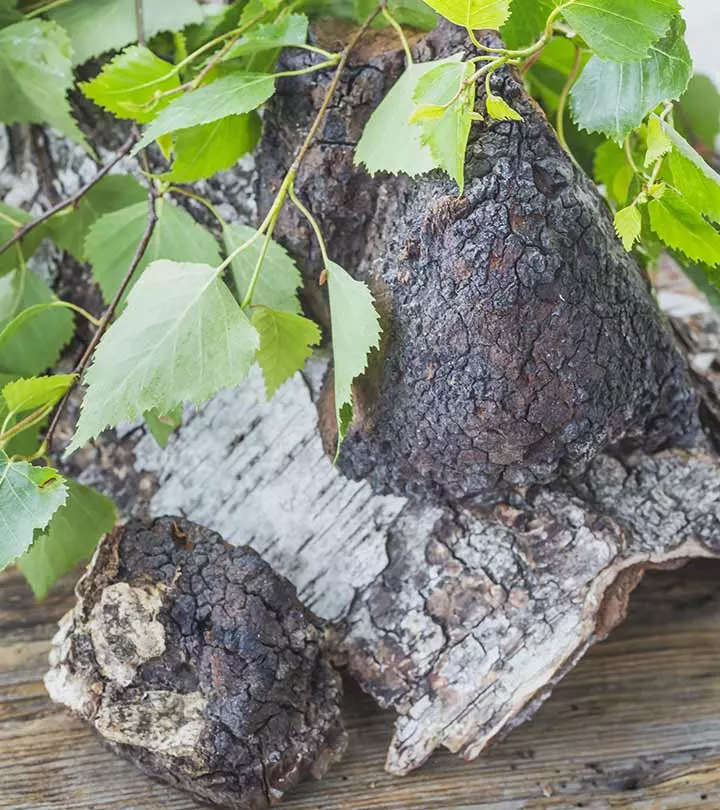
Image: Shutterstock
It’s not surprising to say that nature can treat every ailment. It offers us the purest medicines in flowers, shoots, twigs, and roots. Even parasites and pests serve as natural medicine. The Chaga mushrooms’ benefits are gaining attention in this context.
Mushrooms have been a part of a healthy diet for ages, and Chaga mushrooms are no exception. This mushroom variant can offer an array of health benefits.
Learn more about how this fungus can benefit your health. Continue reading.
In This Article
What Is Chaga Mushroom?
Chaga mushroom (Inonotus obliquus), a.k.a. clinker polypore or cinder conk, is a parasitic white rot fungus belonging to the Basidiomycetes family. For a parasite, it has miraculous abilities to reduce cancer cell growth in preclinical setting and improve digestive issues and tuberculosis.
It grows on the barks of birch trees in cold northern climates like in Siberia and other parts of Russia. Which is why chaga has been used in Russian folk medicine since the 16th century.
Several stories and myths abound on how a deadly mushroom can help in healing. But in this article, I will help you get to the facts.
Food For Thought!
- Why do chaga mushrooms grow only on birch trees?
- How are these mushrooms different from the rest in terms of activity?
- What is the meaning of the word “chaga”? Why is it called Chaga mushroom?
Before we proceed, let me ask you, why are you even reading this article on chaga?
Perhaps you got to know it is good for health and has no side effects.
But did you ask yourself what makes chaga different from the other white rot or Basidiomycete fungi? If yes, awesome! If no, even better.

Because I think I got the answers! Scroll down to know why.
What Is Unique About Chaga Mushrooms?
1. Appearance
Chaga mushrooms are easy to recognize. They have a black, crumbly, cinder-like exterior and a brown to yellow mottled, corky interior.
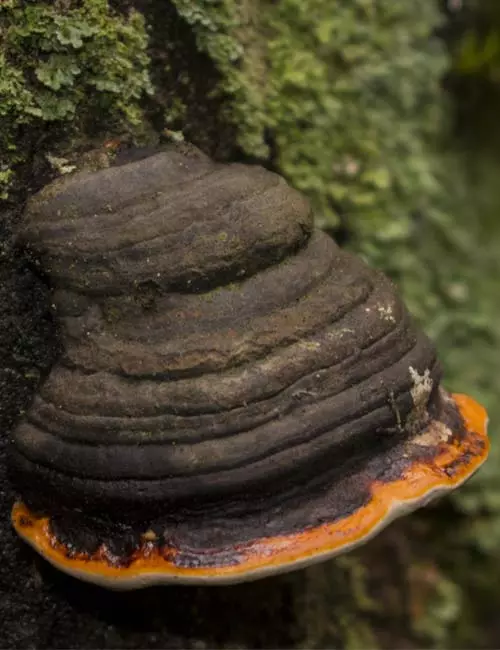
2. Habitat
In nature, the chaga fungus is a primary pathogen of birch, eventually killing its host. Chaga usually penetrates the tree through the injuries on its bark. It then gradually spreads vertically and laterally through the trunk, causing a white heart rot.
Mature chaga ruptures the bark of the tree in places, exposing a black, crumbly, charcoal-like mass of fungal tissue. Something like this…
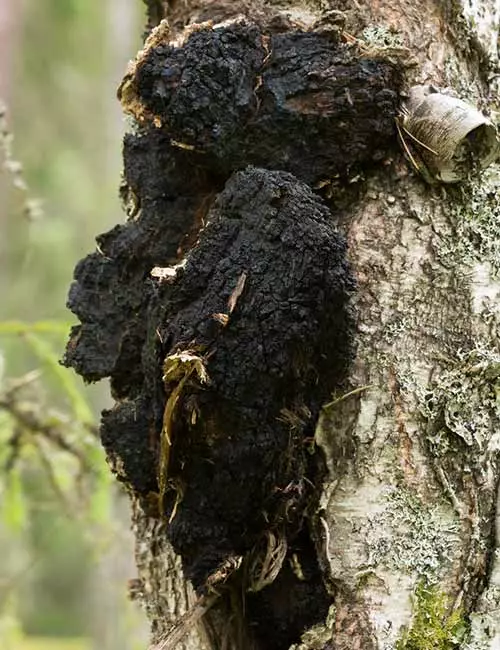
Bits of fungal tissue from the conk are dispersed by wind and water to infect new host trees (1).
3. Growth
Chaga is a slow-growing fungus and must at least be 3 to 5 years old before it can be used for its benefits. When the host trees die, so do the chaga mushrooms – becoming toxic with other molds, fungi, and mycotoxins.
Though chaga grows on many different species of trees, only the variety from the white or golden birch offers the plant-based sterols, betulinic acid, and other constituents that can help with a severe disease like cancer.
4. Phytochemical Composition
Chaga mushrooms are rich in organic acids, including oxalic acid, gallic acid, protocatechuic acid, betulinic acid, and p-hydroxybenzoic acid. These mushrooms are also rich in triterpenes and phytosteroids that give them their characteristic antimicrobial, antioxidant, and anticancer effects (2).
With such distinguishing properties, chaga mushrooms stand tall among the Basidiomycetes. These white rot fungi have some mind-blowing benefits for your body. They are not just any other ugly-looking outgrowths on trees. Go ahead and see for yourself!
In What Ways Can Chaga Mushrooms Benefit You?
1. Reduce Cancer Cell Growth And Prevent Cancer
Many studies emphasize the anticancer properties of chaga mushrooms. Their fungal bioactive compounds prevent the proliferation of cancer cells. And the best part is these mushrooms are not toxic to the healthy cells.
The inotodiol and lanosterol in chaga fight oxidative stress. They also trigger cancer cell death (3).
Water and chloroform extracts of chaga mushrooms have shown anticancer effects on adenocarcinoma, lung cancer, colon cancer, skin cancer, and hepatocytes (liver cells) (4).
2. Promote A Healthy Gut

Chaga has 98.6% polysaccharides, and the rest is made of monosaccharides like mannose, rhamnose, glucose, galactose, xylose, and arabinose.
The polysaccharides induce changes in the gut microbiota, boosting the beneficial bacteria. The result of the study states that the predominant phylum was the good gut bacteria, Bacteroidetes.
With increased Bacteroidetes come better digestion, absorption, and assimilation (5).
Petrena Schell, a YouTuber consumes chaga mushrooms regularly for her gut health and shares her experience in a video. She says “I’ve really been working on my gut health and healing my gut and I’ve definitely noticed massive benefits in my digestion from taking it (i).”
3. Manage Inflammation And Related Conditions
Mushroom metabolites have potent anti-inflammatory effects. And medicinal mushrooms like chaga, shiitake, and reishi produce active compounds such as polysaccharopeptides, polysaccharide proteins, lipids, terpenes, phenols, etc.
These bioactive compounds activate the natural killer cells (NK cells), macrophages, dendritic cells (DCs), and other precursors to produce anti-inflammatory chemicals (cytokines). These cells fight allergens, pathogens, and other sources of inflammation in your body.
Eating chaga or drinking its tea can treat autoimmune diseases like dermatitis, irritable bowel disease, psoriasis, Crohn’s disease, cirrhosis, asthma, GERD, and type 2 diabetes (6).
4. Protect Your Liver
Chaga mushrooms have exceptional hepatoprotective effects, thanks to their antioxidant and anti-inflammatory properties.
Water extracts of chaga mushrooms can treat liver injury at concentrations as low as 10 mcg/ml. The extract can fight free radicals and inhibit the accumulation of toxic intermediates in the hepatocytes (7).
5. Might Control Vitiligo And Pigmentation Issues

No matter what color you are, your skin pigment is important as it protects you from cancers. Melanin is the pigment responsible for your skin color, and tyrosinase is the enzyme that makes melanin.
Changes in tyrosinase levels have a significant impact on the health and color of your skin. The bioactive components of chaga mushrooms have tyrosinase-inhibitory activity and can help in skin whitening and preventing cancers.
Few components of chaga have also shown pro-tyrosinase activity. Meaning, chaga mushrooms might reduce the intensity of white patches in people with vitiligo. This paradox, however, needs more research to know the underlying mechanisms (8).
A cross-sectional, population-based online survey of more than 40,000 adults in the US revealed a vitiligo prevalence of 1.38% (self-reported) and 0.76% (clinician-assessed). Participants averaged 44.9 years, and 56.7% of them were females. 74.4% of them were white, while 10.3% were hispanic.
6. Triggers Weight Loss

Chaga tea is considered one of the secrets behind the slim physiques of the Japanese. In one study, administering equivalent doses of chaga tea daily (6 mg/kg/day) reduced the body weight in middle-aged mice significantly.
This shows that intake of chaga mushrooms promotes lipolysis in age-accumulated adipose (fatty) tissue. Moreover, many studies show that water-soluble components extracted from I. obliquus improved insulin sensitivity and reduced fat accumulation in obese mice.
Moral of the story: Chaga mushrooms have beneficial anti-hyperglycemic effects that enhance lipid metabolism (9).
All of the above benefits have to do with chaga’s biochemical and nutritional composition.
Which is why mushrooms are considered excellent sources of proteins, vitamins, minerals, fats, carbohydrates, and amino acids.
Mushrooms’ benefits are attributed to their abundance of vitamins, especially riboflavin, biotin, and thiamine. Most of the mushrooms have about 16.5 % dry matter, of which 7.4% is crude fiber, 14.6% is crude protein, and 4.48% is fat and oil (10).
Chaga mushrooms are medicinally superior as they contain over 215 phytonutrients, and glyconutrients such as betulinic acid, polysaccharides, beta glucans, tripeptides, triterpenes, and sterols.
I was a hardcore mushroom hater. When I tried a few tea recipes with chaga and its close friends, I just melted. If prepared well, chaga mushroom tea can top your comfort teas list.
 Quick Tip
Quick TipDo you want to know what the life-changing (literally) tea recipes are? Check out the next section.
How To Prepare Chaga Tea
I’m giving you the recipe that would make a large batch of chaga tea. You can scale down as per your requirement.
What You Need
- Chaga mushrooms: 1-2 spoons of powder per person or 1-2 chunks (not bigger than 1’’ size) per person
- Drinking water: 4 cups (8 oz. each)
- Honey (optional)
- Maple syrup (optional) or
- Sugar (optional): to taste
- Wide bottom teapot
Let’s Make It!
- Take a pot with the wide bottom.
- Place the chaga chunks or powder at the bottom of the pot.
- Add the water and leave it to boil with the cover off.
- When your chaga tea starts to boil, turn the heat to low.
- After 30 minutes of simmering, turn off the heat and let it sit for a few minutes. The water should be brown already.
- Strain off the big chunks or grainy mass and serve it hot.
- Add honey or maple syrup (or sugar) if you like your tea sweet.
- Sit back and enjoy your detox!
For those of you that don’t like the woody, earthy, and mildly bitter (but not-so-bad) taste of chaga tea, you can try using dried chaga chunks, commercially available chaga tincture, etc., to get the goodness.
Now what can chaga mushroom powder be used apart from using it for making chaga tea? Find out in the section below.
Uses Of Chaga Mushroom Powder
Here are some ways to use the powder:
- You can mix the chaga powder into your morning coffee, or hot water. The slightly earthy flavor, adds depth to your beverage.
- Blend a teaspoon of chaga powder into your daily smoothie for an extra nutritional kick.
- You can add chaga powder to soups or broths. It can subtly enhance the flavor while providing a nutrient boost.
- Sprinkle chaga powder on top of your meals like you would with a seasoning. It pairs well with both sweet and savory dishes.
I’ve got some good news for you!
You can now buy chaga mushroom capsules online.
 Quick Tip
Quick TipBut could there be an issue with taking supplements? What if they turn out to be synthetic or contaminated? Are there are any risks associated with taking chaga mushrooms?
All valid worries. Scroll down to find the answers.
Are There Any Side Effects Of Having Chaga Mushrooms?
There is not much evidence or case studies that demonstrate the risks associated with chaga mushrooms. And that is what current research should throw light on.
Despite all the goodness, chaga mushrooms still are biologically fungi. There are fair chances that your body might react to these mushrooms – whether you take them fresh or in the form of supplements. You may face issues even if you are allergic to birch trees.
Since chaga mushroom is a potent diuretic and vasodilator, your kidneys can get burdened by the tea. Consult your physician if you feel dehydrated and have a creatinine imbalance.
The words of caution from us would be:
- Try a small test dose of chaga supplement or tea first. Observe how your body reacts to it. If you don’t develop an allergy or stomach discomfort, consult your physician to frame a suitable dose for you.
- Before buying a supplement, do your research. Find out how the mushrooms are processed.
- Heating destroys most of the active components in the fungi. Prefer cold-pressed or alcohol extracts.
- Find out how old the mushroom is. The older, the better. Young mushrooms do not accumulate the compounds of our interest in them.
- If you don’t eat the chaga mushrooms of the right age, you might face the wrath.
You Need To Know This: Chaga Poaching
Due to its growing demand, this slow-growing chaga fungus has been overcollected to the extent that it is becoming ‘extinct’ in some parts of its range.
In response, researchers have developed ways to grow the fungus on artificial media. Unfortunately, these lab-grown chaga mushrooms lack the beneficial medicinal properties of the same fungus grown on wild birch.
Harvesting and consuming premature chaga is illegal and can be fatal, respectively.
The Final Word
Chaga mushrooms have been included in many traditional Russian folk medicines. This species of white-rot fungus contains plenty of beneficial phytonutrients and essential nutrients. It is one of the healthiest sources of nutrition that is delicious, gluten-free, and organic. The benefits of Chaga mushrooms include a healthy gut and a reduced cancer risk. Moreover, they may help reduce inflammation and the severity of autoimmune diseases like IBD and GERD. The anti-inflammatory and antioxidant properties of Chaga mushrooms may help promote liver function and aid in weight loss. The cold Siberian mountains are home to this black, slow-growing fungus. You can harvest fresh Chaga mushrooms in the wild, while it also is available as a supplement or powder. Consuming Chaga mushroom tea is a great way to reap its benefits. Enjoy this mushroom to its fullest potential while limiting your intake. Also, as this fungus is found on birch trees, avoid its consumption if you are allergic to birch trees. Excess consumption of Chaga mushrooms may leave you dehydrated or, in severe cases, damage your kidneys. This is primarily due to its diuretic and vasodilatory properties. Seek medical advice in such situations. Since the safety standards have not been determined yet, pregnant and breastfeeding women should consult a doctor before consuming these mushrooms.
Frequently Asked Questions
Do Chaga mushrooms make you sleepy?
No. Chaga mushrooms do not make you sleepy. However, they are known to have adaptogenic properties that can help you deal with stress and anxiety, making you relax after a long day. This may aid healthy sleeping patterns.
Are Chaga mushrooms good for constipation?
Yes. Chaga mushrooms are high in dietary fiber, which is good for the digestive system and improves bowel movement.
Key Takeaways
- Chaga mushroom is a parasitic fungus known for its rich antioxidant and organic acid content that are said to offer various health benefits.
- It may help trigger cancer cell death, improve digestion, treat liver issues, and reduce inflammation.
- You may consume it as tea, add it to your smoothies, or sprinkle it on your meals or soups.
- Always begin with a small amount to make sure you are not allergic to it and to assess your body’s reaction to it.
The chaga mushroom is touted for its ability to boost immune health, fight cancer, has anti-inflammatory properties, and reduce cholesterol. Check out the video below to learn more about this mushroom and its potential health benefits.
Personal Experience: Source
StyleCraze's articles are interwoven with authentic personal narratives that provide depth and resonance to our content. Below are the sources of the personal accounts referenced in this article.
(i) Chaga Mushrooms (Inonotus Obliquus) | My Experience & Reviewhttps://www.youtube.com/watch?v=_z8xtlHJVgo
References
Articles on StyleCraze are backed by verified information from peer-reviewed and academic research papers, reputed organizations, research institutions, and medical associations to ensure accuracy and relevance. Read our editorial policy to learn more.
- “Inonotus obliquus” from folk medicine to clinical use
- “Chemical Characterization and biological activity…” Journal of Ethnopharmacology, US National Library of Medicine
- “Anticancer activity of subfractions containing…” Nutrition Research and Practice, US National Library of Medicine
- “Anticancer effects on fraction isolated from…” International Journal of Medicinal Mushrooms, US National Library of Medicine
- “A Critical Review on Health Promoting Benefits…” International Journal Of Molecular Sciences, US National Library of Medicines
- “Antiinflammatory and Immunomodulating Properties of…” Mediators of Inflammation, US National Library of Medicine
- “Hepatoprotective Activity of Water Extracts…” International Journal of Medicinal Mushrooms, US National Library of Medicine
- “Inhibitory and Acceleratory Effects of…” Evidence-based Complementary and Alternative Medicine, US National Library of Medicine
- “Continuous intake of the Chaga mushroom…” Heliyon, US National Library of Medicine
- “Medicinal and Antimicrobial Properties of Mushrooms” Science Vision, Academia
Read full bio of Dr. Ramon Andrade de Mello
Read full bio of Swathi Handoo
Read full bio of Ravi Teja Tadimalla
Read full bio of Himanshi Mahajan






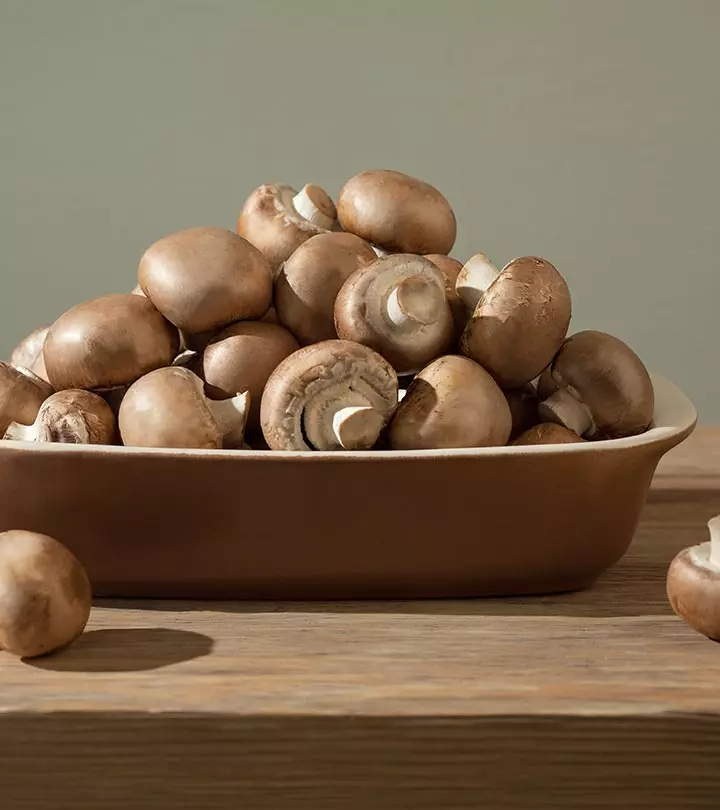
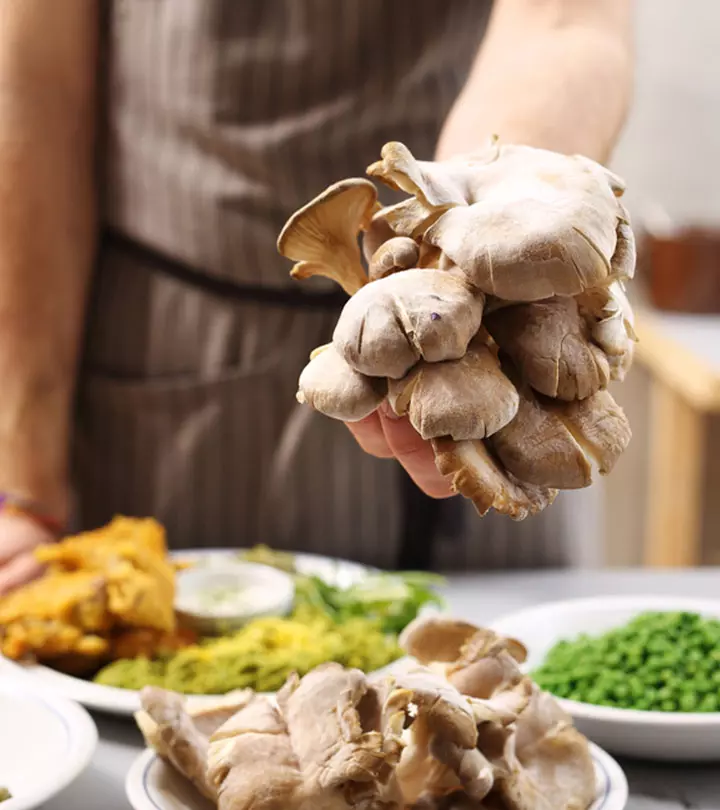

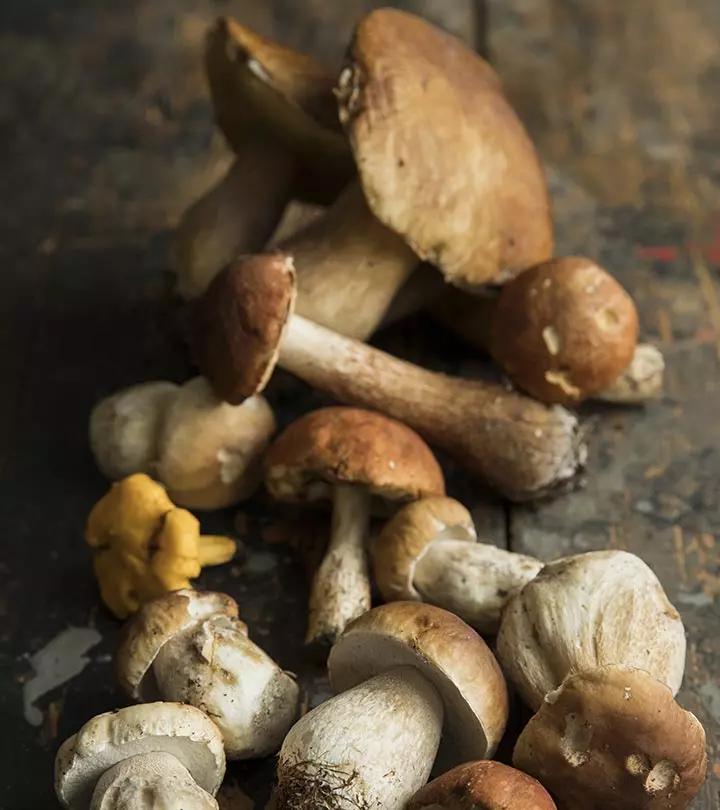
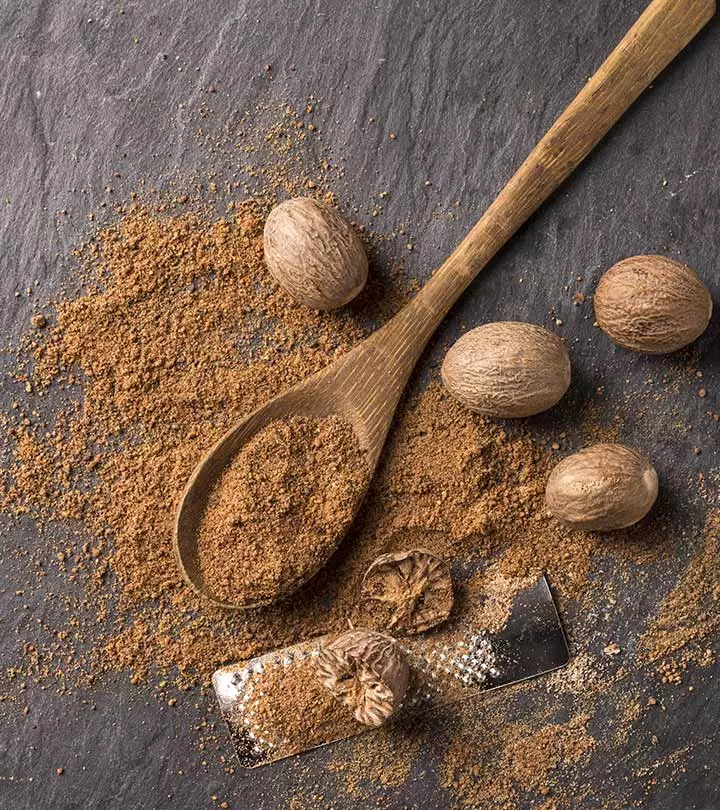
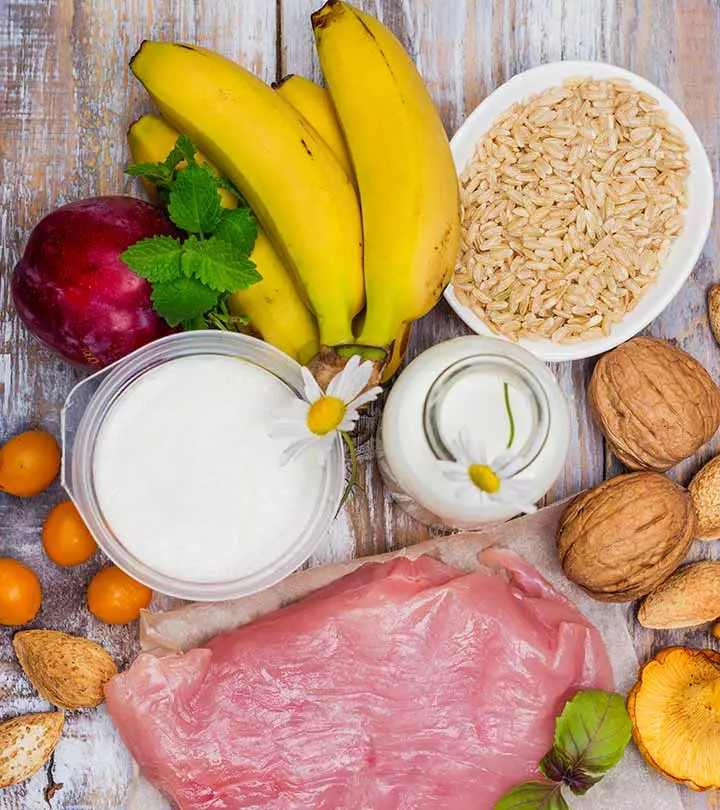

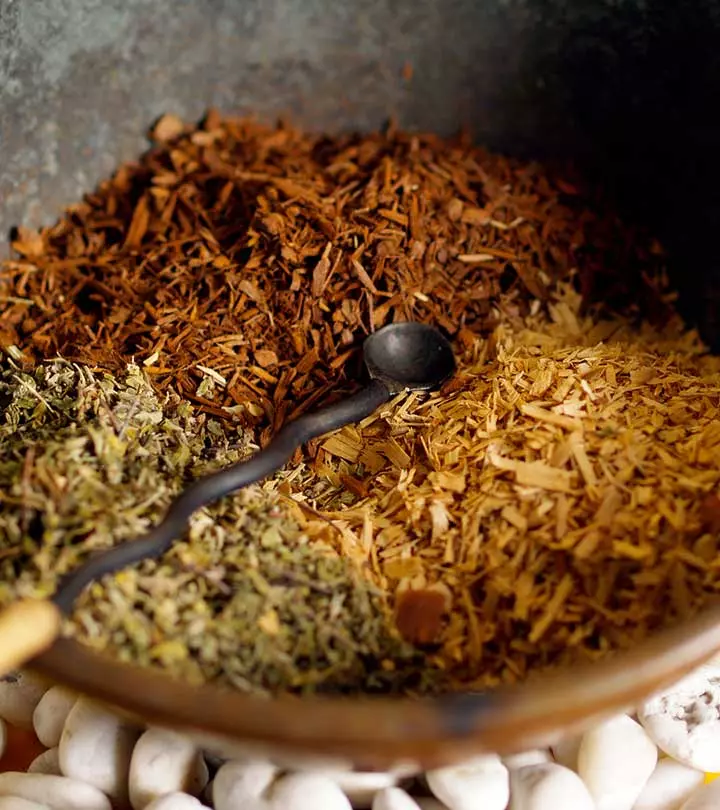
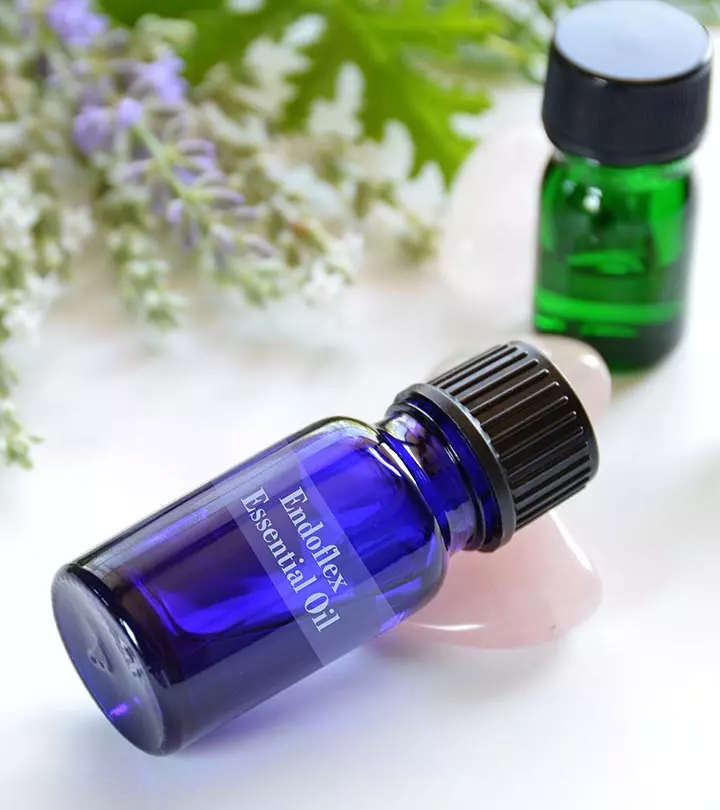
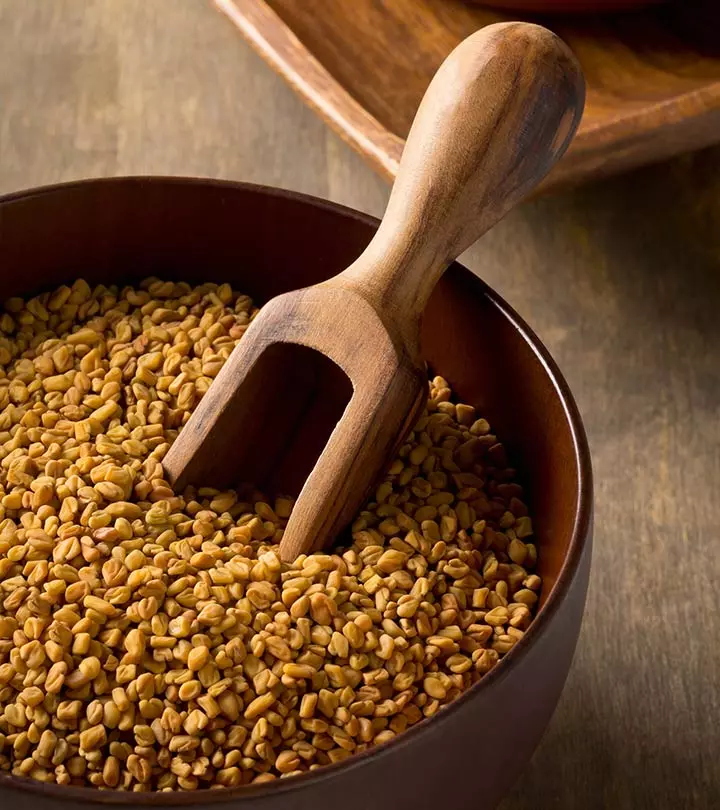
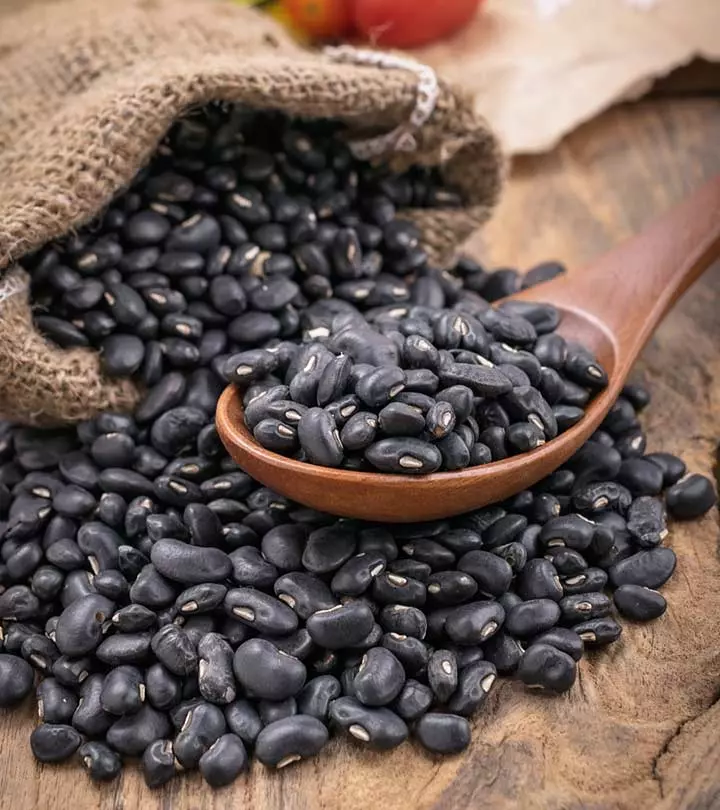
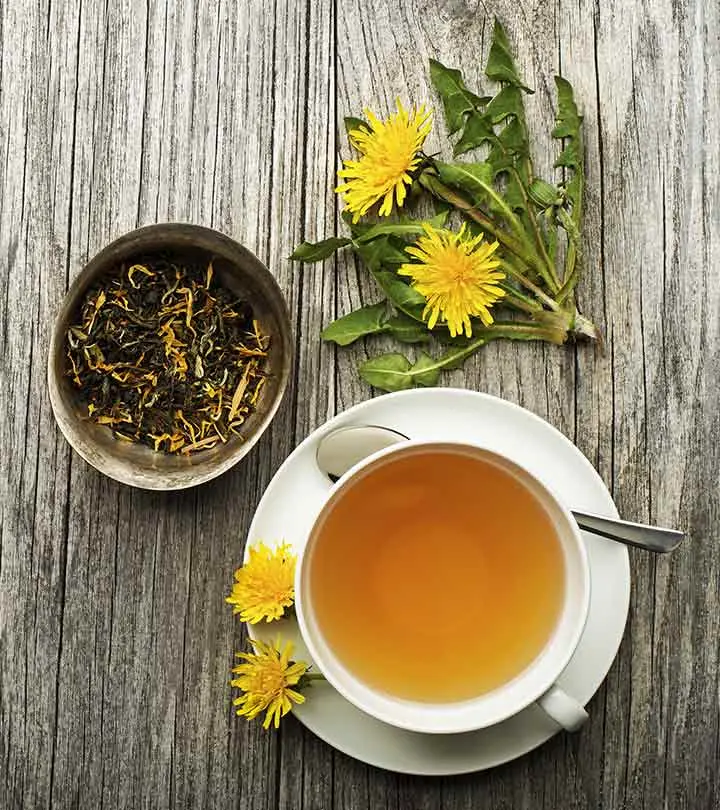
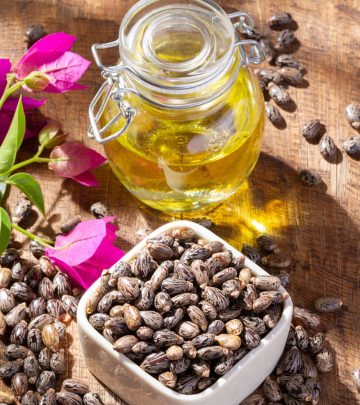
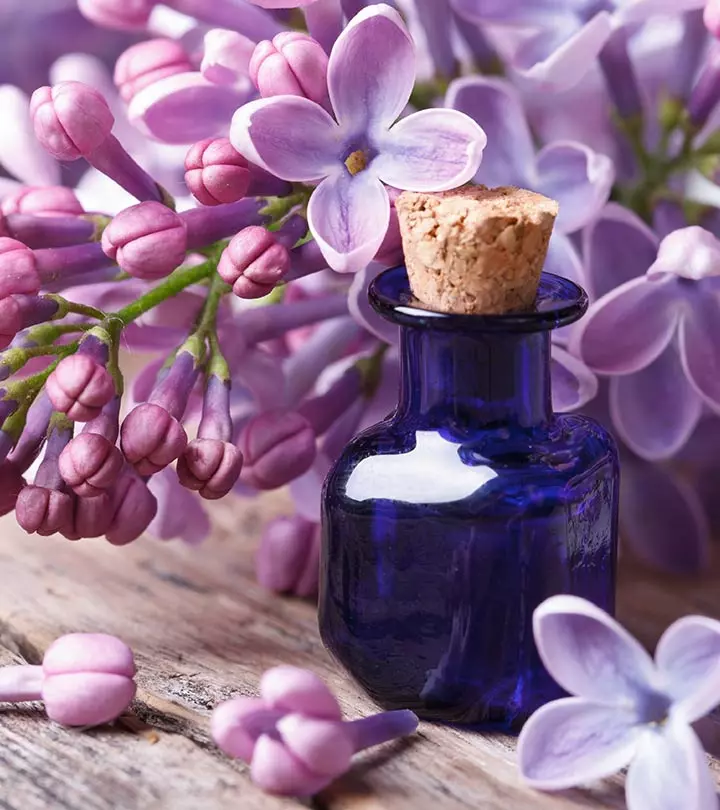

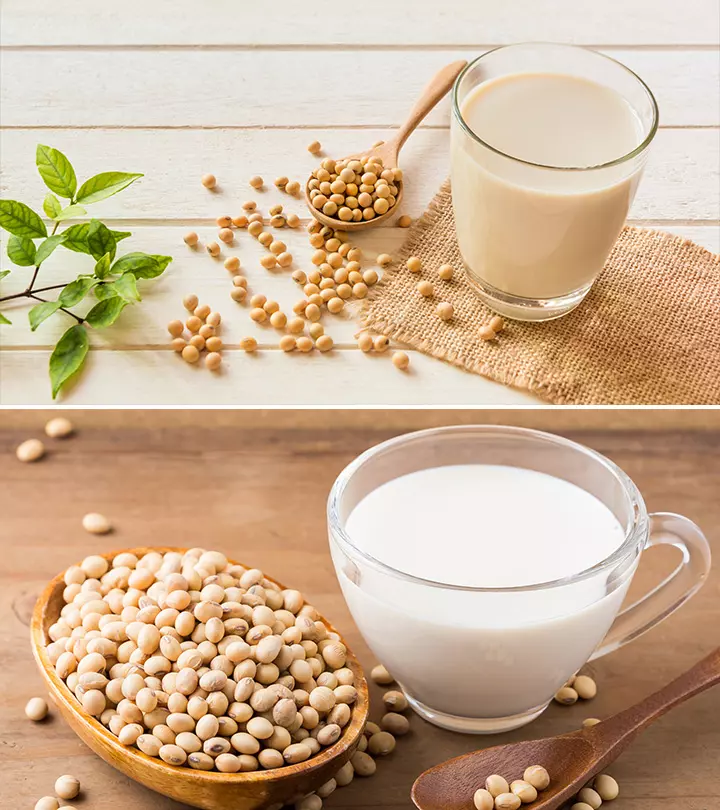
Community Experiences
Join the conversation and become a part of our empowering community! Share your stories, experiences, and insights to connect with other beauty, lifestyle, and health enthusiasts.